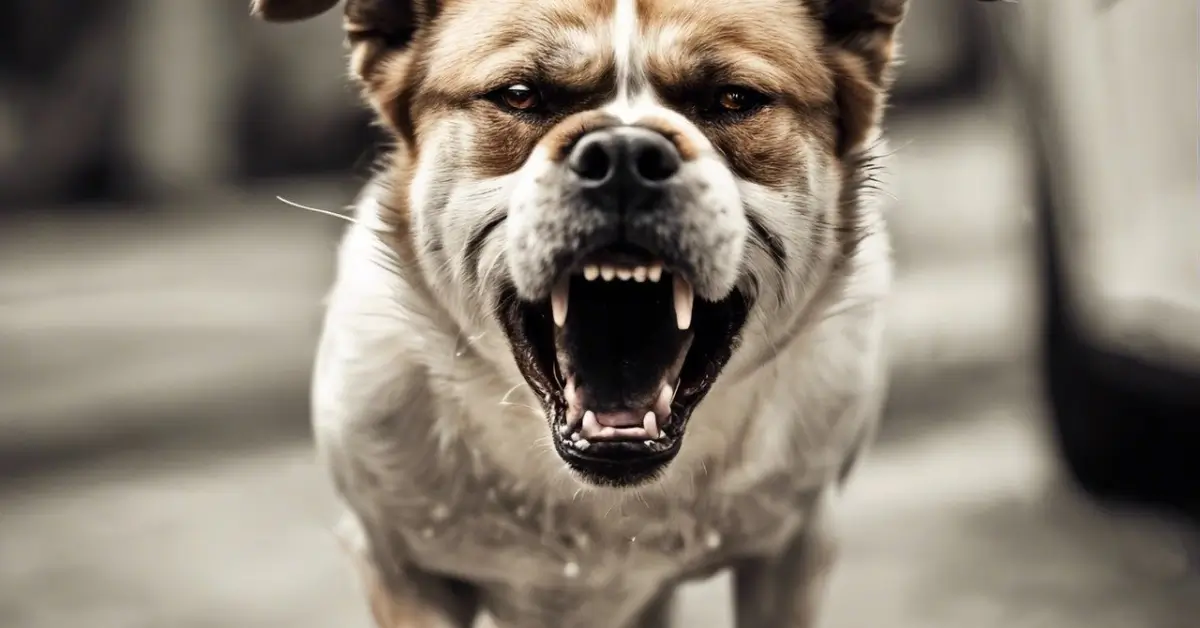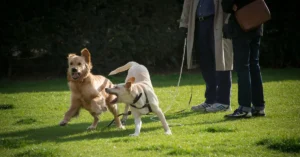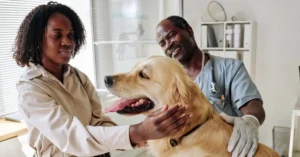Does your dog become a growling, barking, or even biting beast when the sun goes down? If so, you’re not alone. Many pet owners wonder, “Why does my dog get aggressive at night?” Understanding the causes of this nighttime aggression can help you tackle the issue effectively, ensuring a calm and peaceful environment for you and your furry family member.
Unraveling Canine Behavior
Examining your dog’s instincts and behavior patterns is essential to understanding why it is aggressive at night. Dogs have evolved with certain instincts that can still influence their actions today. Additionally, how they behave during the day and at night can provide clues to their nighttime aggression.
Instinctual Drives
Dogs have instincts that influence their behavior. These instincts can sometimes make a dog aggressive at night. Canine ancestors were more alert and protective during the night in the wild. It was because nighttime was when most threats occurred. Your dog may still carry these protective instincts, making them more aggressive as darkness falls.
Daytime vs. Nighttime Behavior
You might notice a big difference between your dog’s daytime and nighttime behavior. During the day, they may be relaxed and playful. But at night, they may become more alert and easily startled. This change can trigger aggressive behavior. Understanding this day vs. night behavior shift is crucial. It helps explain why your dog may become aggressive at night.
Common Triggers for Nighttime Aggression
Fear and Anxiety in the Dark
Fear and anxiety can greatly contribute to nighttime aggression. A puppy or even an older dog may become anxious due to the dark and unfamiliar noises. This fear can cause your dog to bark, growl, or even lunge aggressively. Helping your pet feel safe and secure at night can reduce this fear-induced aggression.
Insufficient Stimulation
Dogs need both physical and mental stimulation. With enough of both, they can become restless and aggressive. A dog without enough exercise or mental stimulation during the day may become aggressive at night. Providing toys, playtime, and engaging activities can help keep their behavior in check.
Health-Related Reasons
Pain and Discomfort
If your dog is in pain from an injury or health issue, they might become aggressive when disturbed. It is a natural reaction to protect themselves. If you suspect pain is the cause, visiting the veterinary clinic is essential. The vet may prescribe medication to ease your dog’s discomfort.
Sensory Decline with Age
As dogs age, they may experience a decline in their senses. Vision and hearing loss can make nighttime more confusing and frightening. This sensory decline can cause a dog to react aggressively to what they perceive as threats. Keeping a consistent routine and environment may help older dogs feel more secure. If your dog shows signs of cognitive dysfunction, consult your veterinarian.
Tackling Nighttime Aggression
Setting Up a Consistent Routine
Establishing a consistent routine can help reduce your dog’s nighttime aggression. Dogs flourish with routine, and having predictable patterns can make them feel more secure. Regular feeding, playtimes, and bedtime rituals can calm your dog and reduce aggressive behavior. This routine also ensures your dog gets enough exercise throughout the day, which can prevent excess energy buildup at night.
Seeking Professional Training
If your dog’s aggressive behavior at night continues, seeking help from a professional dog trainer might be necessary. A dog trainer can identify the triggers for your dog’s aggression and develop a customized plan to address these issues. Training techniques like positive reinforcement can teach your dog to behave calmly and reduce aggressive reactions. Consulting a veterinarian is also important to rule out any underlying medical issues causing the aggression.
Ensuring a Safe and Cozy Environment
Optimizing the Sleeping Spot
Creating a safe and relaxed sleeping spot for your dog can make a big difference. Ensure its bed or crate is cozy and in a quiet, secure part of your home. Avoid areas with a lot of noise or activity that could startle them. A familiar environment helps your dog relax and feel safe, reducing aggressive behavior at night.
Using Nighttime Anxiety Aids
Sometimes, dogs need a little extra help to calm down at night. Nighttime anxiety aids, like calming treats or pheromone diffusers, can help soothe your dog’s nerves. Providing a favorite toy or blanket with your scent can also be comforting. These tools can significantly reduce nighttime aggression by helping your dog feel more at ease.
Knowing When to Consult a Veterinarian
Recognizing the Need for Medical Help
It’s important to know when to seek veterinary advice. If your dog’s aggressive behavior at night is sudden or severe, it could be a sign of an underlying medical issue. Conditions like cognitive dysfunction, pain, or even a behavioral disorder can cause aggression. A veterinary professional can evaluate your dog and identify any health problems that must be addressed.
Potential Medical Treatments
Once a veterinarian identifies the cause of your dog’s nighttime aggression, they can suggest appropriate treatments. These might include medications for pain or anxiety, supplements for cognitive health, or other medical interventions. Addressing the underlying cause of the aggression can help your dog feel better and behave more calmly at night.
Conclusion
In conclusion, recognizing the significance of exercise for dogs is important for their happiness and overall well-being. Regular physical activity keeps them fit and strengthens their muscles and joints. It helps prevent obesity and other connected health problems, ensuring your furry friend’s longer and more active life.
Additionally, mental stimulation through play and exercise is vital for preventing boredom and behavioral problems in dogs. It offers an outlet for their instincts and energy, decreasing the chances of destructive behaviors like chewing or excessive barking.
Remember, each dog is unique, so tailor its exercise routine to its age, breed, and individual needs. Begin with brief sessions and gradually intensify as its fitness level improves. Always prioritize safety during exercise to avoid injuries.
Integrating consistent exercise into your dog’s daily schedule enhances its physical well-being and strengthens the bond between you and your pet. So, lace up those shoes, get your dog’s favorite toy, and enjoy staying active together!
FAQ
Q: Why does my dog get aggressive at night?
A: Dogs can become aggressive at night due to various reasons. Instincts from their ancestors, like being alert in the dark, can make them protective and territorial. Changes in their environment or routine, like disturbances outside or a lack of exercise during the day, might also contribute to nighttime aggression. Some dogs may feel anxious or fearful in the dark, leading to defensive behaviors like growling or barking. Ensuring your dog has a safe space to sleep and addressing any health concerns can help alleviate nighttime aggression.
Q: How can I stop my dog from being aggressive at night?
A: To reduce nighttime aggression in your dog, build a consistent routine that includes regular exercise and mental stimulation during the day. A relaxed and safe sleeping area can help them feel safe at night. Avoid shouting or punishing your dog for aggressive behavior, as this can increase their anxiety. Instead, use positive reinforcement techniques like rewarding calm behavior with a delicious treat or toy. If the aggression persists, consult a professional dog trainer or veterinarian for personalized advice.
Is nighttime aggression in dogs normal?
A: Dogs’ nighttime aggression can be influenced by their instincts and individual experiences. While some dogs may become more alert and protective at night, excessive aggression or sudden changes in behavior could indicate underlying issues like fear, anxiety, or health problems. Monitoring your dog’s behavior patterns and promptly addressing any concerns can help maintain a peaceful environment for you and your pet.
What should I do if my dog wakes up aggressive?
A: If your dog wakes up aggressively, remain calm and avoid sudden movements. Give them space and time to calm down before approaching. Avoid startling or shouting at them, as this can escalate the situation. Assess their environment for potential triggers, such as outside noises or disturbances. Providing reassurance and a safe space can help your dog feel more secure and reduce aggressive behavior upon waking.
How can I tell if my dog’s aggression is due to a medical issue?
A: If your dog’s aggression seems sudden or uncharacteristic, it’s essential to rule out any underlying medical conditions. Behavioral changes, including aggression, can sometimes be linked to pain, discomfort, or cognitive decline in older dogs. Schedule a veterinary check-up to evaluate your dog’s health and discuss any observed behavior changes. Your veterinarian may recommend tests or treatments to address medical issues contributing to your dog’s aggression.




